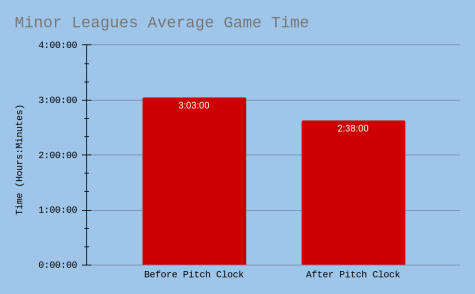The MLB Aims to Make Baseball More Appealing
As our society progresses towards a faster paced life and a constant need for action, the MLB aims to adjust the game of baseball to appeal to a broader audience. New rules will be implemented into the 2023 MLB Season, headlined by the addition of a pitch-clock. Hitters and pitchers must both adjust to the new time restrictions, which aim to decrease the length of games and to popularize and modernize America’s pastime.
The Joint Competition Committee has voted to implement the pitch clock which will also include making the bases larger, adding a restriction on shifts, and the most controversial: the addition of a pitch clock. Between batters, there is a 30 second timer and between pitches, a pitcher has 15 seconds. That 15 seconds is increased to 20 seconds when there are runners on base.
As for batters, they must be in the batter’s box before the pitch clock has 8 seconds remaining. If a pitcher fails to beat the clock, a ball is awarded; batters are awarded a strike if they violate the clock.
If there are runners on base, the timer resets if the pitcher attempts a pickoff. Pitchers only get 2 of pickoffs per plate appearance unless the runner on base advances. In that case, the limit will reset to 2 pickoff attempts. If a third attempt is made and is not successful the runner will advance. With these rules, people hope the game will be quicker overall.

A common complaint amongst those who are not very fond of baseball and even amongst some who are, is the game’s snail-like pace. As for Olivia Anderson, a student at Hall High School and a die-hard Yankees fan exclaimed, “I like it. I think with a pitch clock there will be much more action going on at all times making [the game] more interesting for the fans to watch.”
In support of this statement, the MLB revealed that through their experimentation with the pitch clock in the Minor League, the length of a baseball game (on average) decreased by 26 minutes. For this reason, the MLB would like to incorporate it into the professional level.
Both hitters and pitchers will be affected by the pitch clock and will have to reduce the amount of time they take to prepare prior to enacting their role. There is worry that this might increase the frequency of injuries in the league, but Brett Franklin, a well-known mathematics educator here at Hall and a long-time baseball fan, stated that “Players should be able to adjust quickly. I think there will be some problems early on, but they’ll adjust.”
As with any change, there is a lot of backlash arising from these new rules. Injuries may become more prevalent and might cost players their ability to perform at a high level. A recent study by McMaster University revealed that pitchers are more likely to experience arm fatigue while held to the constraints of the pitch clock.
With less time for pitchers’ arms to recover between pitches, arm fatigue increases, especially in the elbow. This makes the pitcher more susceptible to UCL tears. For example, in the last few years, Brent Suter has led the MLB with the quickest pace between pitches. In July of 2018, Suter tore his UCL and underwent Tommy John surgery and missed over a year of playing.
From a General Manager’s perspective, it is a risk to sign players to longer, and more expensive contracts. Vince Velazquez, a Pittsburgh Pirates pitcher, says that “in this game, it’s all about strategizing and really finding ways to get guys out. I think that’s the unique thing about baseball nowadays. There’s tons of talent that’s spread around the league, and hitters are doing their homework just as much as [pitchers are] doing [theirs], but I think it takes a little bit more time to kind of strategize and find ways to incorporate those things.”
Similarly, in an interview with Hall Baseball’s Harry Nelson, he said that the pitch clock may be effective, but he questions the cost at which the style of the game will be affected. “Hitters don’t have time to think about the sequences they are seeing,” says Nelson. Regardless of whether or not people like the rule, players are going to need to adjust and do so fast.
Major league baseball implemented many new rules, some targeting the popularity of the sport and others targeting player safety. First, the size of the bases have increased to eighteen square inches. This change was due to the high amount of collisions running the bases. The new base should make it easier for baserunners to avoid the fielders who are standing on the base, looking elsewhere, waiting to receive a throw.
It should also encourage more stolen base attempts which is an exciting aspect of the game. Moreover, pitchers are only allowed two pickoffs/step offs per plate appearance, another reason for more stolen base attempts. We saw these in action during the first weekend of the season as the amount of stolen bases more than doubled from the first weekend of last season.
Additionally, the defensive shift was banned. Two infielders are required to be on each side of second base. This rule was implemented because of the shockingly low league batting average last season. The shift is only a strategy in the major leagues and “It is tough to adjust to it,” said Twins outfielder Joey Gallo.

All in all the game of baseball has progressed over the years. Now that we have the pitch clock: How will players adapt? How many violations will there be? How will it change the strategy of the game? With most of the rules focusing more on offense, could fans begin to dislike the poor performance of pitchers? Only time will tell how fans and the league will react to the additions made to one of the most beloved sports in the world.





